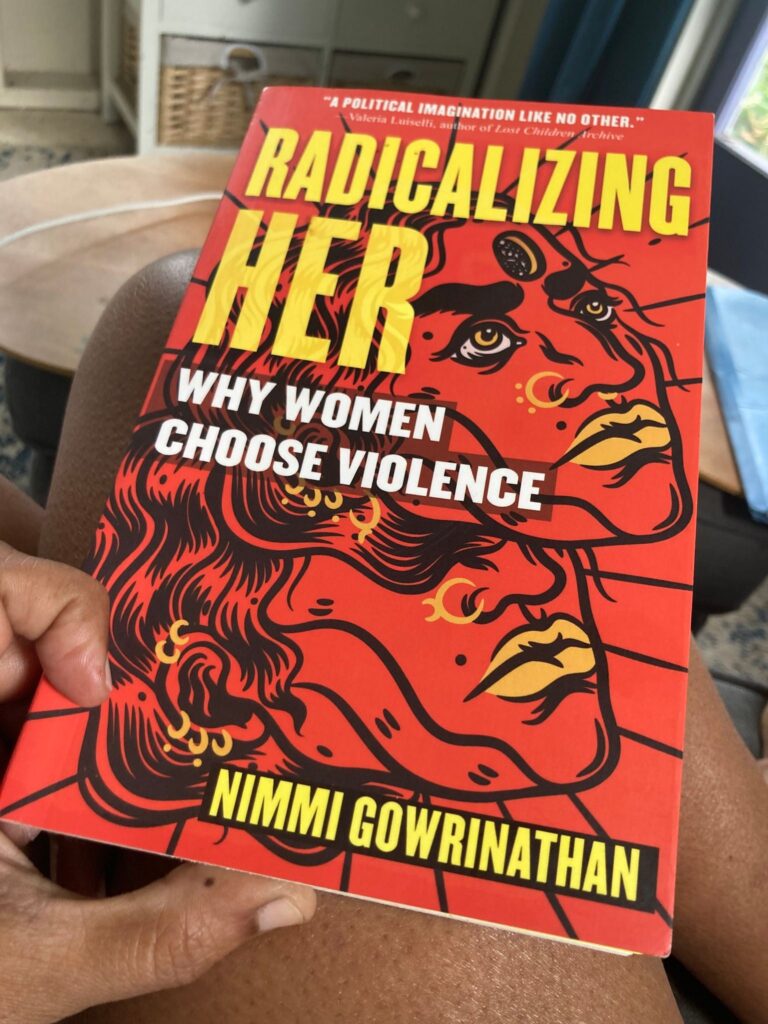I’m taking some time this morning to read a new book by Nimmi Gowrinathan, _Radicalizing Her: Why Women Choose Violence_.
It’s beautifully written, which isn’t something I expect in an academic book, to be honest — she uses a lot of the techniques of creative nonfiction to make for engrossing engagement with the material. She’s poetic in her spare and merciless use of language.
But the meat of the book is in the conversations she has with Tamil female fighters. Just reading the first section has already had me questioning some of the assumptions I’d picked up from other texts I’d read about the conflict, primarily the one that women Tigers were ‘brainwashed’ into fighting, with promises of (Western) equality and independence.
In actuality, what Gowrinathan seems to be arguing, and which I’m finding convincing, is that the women joined the resistance movement for the same reasons men joined — because they knew themselves, their family, their community to be under attack, and they saw violent resistance as the best, perhaps the only, remaining option for them.
I don’t want to sidetrack this into an argument about whether they were right or not, to see violence as a valid path. That’s a bigger discussion, and not one we’re going to resolve in a FB post. (I’m writing a SF novel series that will, hopefully, dig into this in a lot more depth, if I can do the subject justice.) I just want to acknowledge the way Gowrinathan uncovers the sexism inherent in some of the dialogue around women fighters.
I may have to take this book in small bites — the next chapter is on the role of rape in these conflicts. It won’t be easy reading. But it seems the least I can do, to bear witness to what these women not only experienced, but found the courage to talk about, in a society that will punish them for what was done to them.
A few more last photos from FeTNA (where I met Gowrinathan, at a talk she gave). The one with two older men is me on the last morning — as I was getting ready to leave my hotel for the airport, I ran into the swami on the right — he was in some distress with trying to rebook hotel nights, and after I helped a bit with that, it turned out that he needed to go back to the conference site, so I gave him a ride in my Lyft on the way to the airport. A small thing, but this is how he moves through the world — barefoot, deliberately dependent on the kindness and generosity of strangers.
And the photo of many people’s backs — that’s proud parents, taking photos of their children up on stage, who have just received awards for elocution — for memorizing poems and giving speeches in English.
This is what they were fighting for, those Tamil women — to live in peace, to see children grow and thrive, as the world changes around them, over and over again.
No conclusions. Just sadness, really, for what Sri Lankan Tamils have endured, and gratitude for clear-seeing writers who help us make sense of chaos. Hope for better days to come.
*****
“On the question of violence the tendency of contemporary political discourse to parse the world into ‘for’ and ‘against’ camps obscures our view of the female fighter. An understanding of motivations to fight will be read as condoning violence, oppressive agendas given the upper hand by the moral imperative to condemn it. In the end, the false dichotomy serves only as a salve for the selective consciousness of the audience and conversations on political violence are encircled inside an echo chamber. Violence, for me, and for the women I chronicle in this book, is simply a political reality.”





